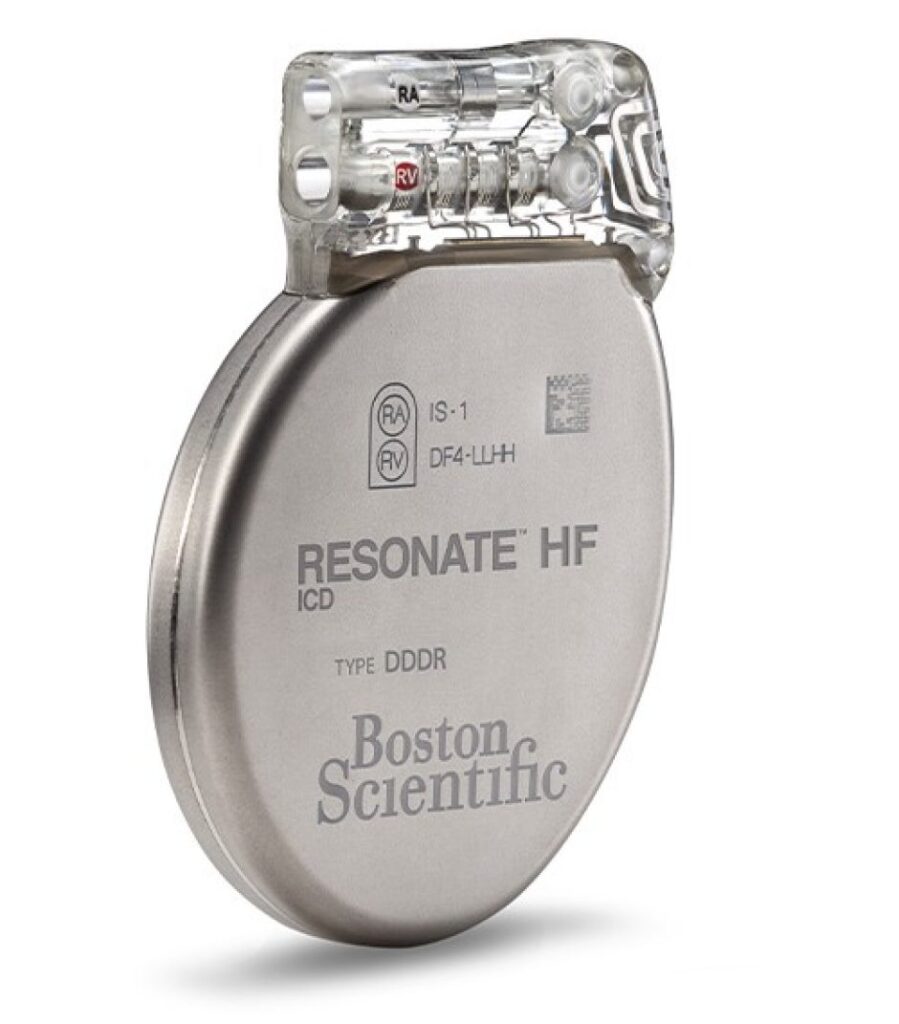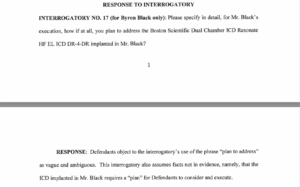
Tennessee’s next execution is scheduled for Aug. 5, and this time, there are even stronger fears about the death becoming torturous.
Lethal injection opponents are always concerned the process is painful. Several studies have found that regardless of the drugs used, the process tends to damage the lungs in a way that creates a drowning sensation.
But the next man slated to undergo the needle, Byron Black, has a sophisticated device implanted in his chest. It doles out powerful shocks if the heart goes out of rhythm. His attorneys and medical witnesses say that is extremely likely to happen as he dies, so the implant would jolt him continuously as he died, causing immense pain.
The Tennessee Department of Correction could bring in an expert to disable the device. That’s the only way to make sure it allows Black to die without interruption.
But attorneys for the state and their medical expert witnesses argue that’s unnecessary. They cast doubt on the likelihood that Black’s device would be triggered during the execution. They also argued that even if it was activated, those severe arrhythmia episodes deprive the brain of oxygen so severely that it would be impossible for Black to process and sense the pain.
Black’s attorneys want the department’s hand forced in the matter. The case has been before a judge in the Davidson County Chancery Court this week.
More: New lethal injection protocol still carries concerns about painful deaths
Black is on death row because he was convicted of a triple homicide that took place in 1988. The court found him guilty of murdering his 29-year-old girlfriend Angela Clay, as well as her two daughters from a previous marriage: Latoya, 9, and Lakeisha, 6. The medical examiner determined they had each been shot while lying in bed.
Since his first sentencing hearing, Black’s attorneys have been arguing he’s not mentally competent enough to be executed. During the time, state laws on mental competency changed, which created the opportunity for Black to be reassessed. Davidson County District Attorney Glenn Funk advocated for a sentence in 2022. The judge declined. The most recent appeal took place just a few weeks ago, when his legal team asked the Tennessee Supreme Court to reconsider his sentence. It declined.
The state’s case
Black’s attorneys submitted questions to the state through the court. They laid out concerns about the heart implant’s risks, and asked what TDOC plans to do to mitigate those risks.
In a June legal filing, state attorneys rejected the premise of what Black’s attorneys are asking, saying there is no need for a plan.
The state argues the Eighth Amendment, which outlaws cruel and unusual punishment, wouldn’t apply here.
“Department does not believe the Eighth Amendment necessitates any alternative plan or actions to carry out Mr. Black’s execution outside the processes described in the Protocol,” the filing reads in part.
In a Wednesday hearing, the state brought in Dr. Litsa Lambrakos, a cardiac electrophysiologist at the University of Miami health system. Among other things, she performs surgeries implanting devices like Black’s.
She said during the kind of arrhythmia that Black could undergo, the heart fails to pump oxygenated blood into the body. Almost instantly, she said, the brain would develop a severe level of oxygen deprivation.
“Mr. Black will not be feeling the shocks, as he will be in a coma,” she testified.
Black’s attorneys disagree
Most of the Monday hearing focused on expert testimony from Dr. Gail Van Norman, an anesthesiologist who specializes in heart surgeries.
She has years of experience working on the kinds of implants Black has, known as implantable cardioverter defibrillators or ICDs. The University of Washington medical system where she has spent most of her career designed a special program focused on the devices: putting them in, helping patients adjust to them, and monitoring the devices while patients are in surgery.
She said her predictions are based on real patient experiences, not hypotheticals.
“ICDs sometimes deliver shocks when they’re not needed,” she said. “This is devastating to patients.”
She said this also happens sometimes to patients who are dying of other causes but who have an implant.
She raised several concerns about how the state’s lethal injection process using pentobarbital could trigger painful electric shocks as Black dies unless the device is disabled by a trained expert.
First, she gave a short anatomy lesson on the heart — that the two upper chambers are called atria and handle blood coming into the heart. And the lower chambers are ventricles, which pump it back out. There’s a dangerous situation where the ventricles quiver instead of pumping normally, called ventricular fibrillation or V-Fib. Van Norman said she’s seen this in patients whose chests were open during surgery.
“It looks like a little bag of snakes,” she said.
Black has an implant, in part, to prevent this from happening. She explained that the drug used in lethal injection, pentobarbital ultimately kills people by stopping their breathing. But in the process, it tends to damage whatever it touches, including the ventricles. That’s because it’s a kind of drug called a barbiturate.
“Barbiturates are extremely alkaline,” she said. “They’re like Drain-O.”
Lethal injections use massive doses of pentobarbital, so the damage is quick and severe. Damage to the ventricles could cause the kind of erratic rhythm that would trigger Black’s implant.
Even without the damage from the high dose, pentobarbital could put Black at risk. Van Norman said barbiturates like pentobarbital used to be common in general anesthesia. But around the mid-1990s, doctors started relying on other kinds of drugs, partially because while they’re in the person’s system, barbiturates can temporarily weaken the ventricles.
She also testified that pentobarbital has no pain-killing effects, so Black would feel the shocks if they did happen.
Options for disabling the device
There are two ways to turn the device off, but only one of them is guaranteed.
The surest route would be having a medical professional come in with equipment that corresponds to Black’s brand of ICD. The company makes so-called “wands,” which can program the devices. They are used in initial programming, as well as check-ups on the device, its functions, and everything it has tracked, like heartbeat patterns.
That’s what Black’s attorneys want the court to order TDOC to do.
The other option would be placing a strong magnet over the implant. The device is designed to shut off under that circumstance.
But the medical witness and Black’s attorneys have argued there are several ways the magnet method could go wrong.
Van Norman said that during her time on the heart implant team, they “interrogated” patients’ devices before they went into the operating room. She learned the “magnet off” setting was often not enabled.
“We ran into that relatively frequently,” she said.
She said she talked with representatives at Boston Scientific, the company that made Black’s implant.
“They told me the default setting is magnet off,” she said.
In one of Black’s attorneys’ filings, they laid out several other risks associated with the magnet method.
One is specific to the execution chamber. Prisoners are strapped to the gurney, and the heavy straps have metal buckles. There are buckles on the shoulder straps that sit just about where an ICD would be implanted.
“If the magnet is placed over the strap, the thick fabric and metal buckle would likely insulate the ICD from the magnet and interfere,” it reads in part.
The sensors are particular.
“Even minor deviations of placement, or movement of the magnet by a few millimeters from its proper location, can cause the ICD not to respond to the magnet and thereby remain capable of delivering shocks,” it reads.
Even with the magnet method, the manufacturer says a trained medical professional needs to come in. There are no medical professionals involved in the state’s process, except at the very end when a physician calls the time of death.
What’s next?
This is one of several challenges to the state’s lethal injection protocol in Davidson County Chancery Court. Chancellor Russell T. Perkins is overseeing them all. He’s expected to make a ruling on this specific issue on Friday.
Attorneys have mounted a broader challenge to the lethal injection protocol’s “one-size-fits-all” approach. Serious health issues are common among death row inmates, who are usually from poor, under-resourced families and then spend several decades in prison before being executed.
Black’s case got splintered off because his execution date takes place before the larger challenge will make its way through the court system.


